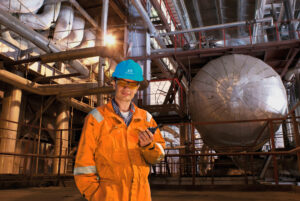
SONY DSC
Energy efficiency is the first step towards decarbonisation of industry. Endress+Hauser can help you make your first move towards reducing emissions – and advise you on what’s still to come on the road to net zero.
The government’s ambitious target to reduce emissions to net zero by 2050 combined with unprecedented rises in energy prices is putting pressure on industry. Reaching net zero will involve the development of a hydrogen economy to service demands for some industrial processes and further expansion of carbon capture and storage in industry to remove greenhouse gases from the atmosphere. While these bold plans could take over a decade to realise, in the short term energy efficiency is the only way to start reducing carbon emissions and associated costs.
Understanding your process
The first step towards energy efficiency is energy monitoring. Only by measuring what goes in and what goes out of the boiler – fuel, steam, feed water, condensate, for example – can you calculate KPIs and benchmark performance. The right measurements will give you much greater insight into your fuel-to-steam efficiency, but not every industrial plant is measuring more than the basic fuel economy of their boiler. To be able to access those additional measurements, such as heat and temperature, you first need to instrument the boiler correctly and then manage the data. Endress+Hauser’s Memograph RSG45 data manager is a tool that can be used to calculate those all-important KPIs, presenting the data in a convenient, graphical way. The information can then be shared with other platforms including the cloud-based software program eSight, which provides automatic and continuous monitoring of performance to baseline targets. Setting a target and being able to track it against real-time information is crucial for effective performance reporting.

For a more accurate determination of energy use in a plant, you may need to measure heat in addition to the mass of the steam from the boiler. Heat measurement is a requirement for compliance with various government initiatives and regulations, including the UK Emissions Trading Scheme and the Renewable Heat Incentive, and the combined heat and power quality assurance (CHPQA) programme. Endress+Hauser has been instrumental in helping many businesses to take advantage of such schemes by providing consultancy services as well as metering, data acquisition solutions and software. Beyond the boiler house, there are other opportunities for metering to improve energy efficiency and protect your profit margin, such as steam metering on a production line.
Comprehensive consultancy services
As well as identifying energy-saving opportunities, Endress+Hauser’s consultancy services include advice on the latest government thinking and strategies so that customers are fully aware of the challenges and opportunities to come. Consultants will look at energy efficiency improvements that can be made now but also the more aspirational long-term projects that would transform the site’s energy efficiency.

Taking a chemical plant in the North East of England as an example, Endress+Hauser recently produced a strategy for energy reduction and decarbonisation. After an assessment of energy use at the site, opportunities were identified to reduce emissions, energy use and costs. These opportunities included energy efficiency measures and heat recovery, improved technology and an extension to the energy management system to achieve ISO 50001 accreditation. The customer was also encouraged to consider a gas-fired CHP solution in the short and medium term to reduce energy costs and make some of the decarbonisation measures (such as heat pumps) viable, and in the long term to consider renewable power generation (solar and wind) and hydrogen generation supported by potential government incentives.
Incentives on the horizon
The need to reduce carbon emissions is clear, and reductions ideally need to be achieved in line with UK targets and strategy for emissions reductions. Any programme of reductions also needs to be balanced with the requirement to control energy and carbon costs and the required capital expenditure. Decarbonisation is generally complex because of the rapidly changing circumstances. This includes uncertain energy and carbon prices, price volatility and the development of new technologies and solutions. It is expected that over the next five years there will be more clarity about solutions appropriate for the UK, including hydrogen, carbon capture, biofuels, biomass and more, and there are significant government incentives planned. For most industrial plants, a staged approach to the reduction of carbon emissions is likely to be the optimum approach, and expert advice will be needed to maximise the opportunities.
For more information on how Endress+Hauser can help you with decarbonisation, visit https://www.smarter-decisions.co.uk/energy-in-focus/

